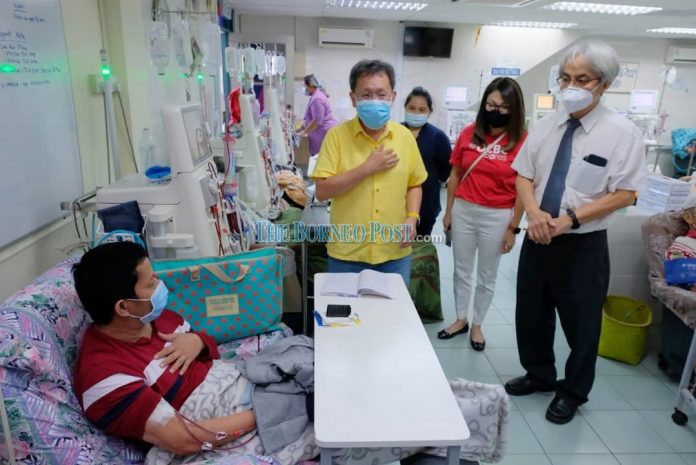
(From right) Dr Wong and Lim accompanying Dr Sim (left, standing) for a brief visit at the dialysis centre. Photo by Muhammad Rais Sanusi
KUCHING (Nov 28): At least 500 individuals in Sarawak are diagnosed with kidney failure and have to begin their dialysis treatment while between 200 and 250 kidney patients die every year, said Local Government and Housing Minister Dato Sri Dr Sim Kui Hian today.
He pointed out that this gave rise to a net increase of about 250 to 300 new kidney patients in the state on an annual basis.
“The total number of kidney patients in Sarawak is 3,544, with 90 per cent of them on haemodialysis and the rest on peritoneal dialysis,” he said when witnessing the handover of RM40,000 from OCBC Bank Kuching Branch to Kidney Association of Sarawak (KAS) and Rotary Club of Kuching (RCK) during a ceremony held at the KAS-National Kidney Foundation (NKF) Dialysis Centre at Jalan Tun Ahmad Zaidi Adruce here.
On hand to present the cheque was OCBC Bank Kuching Branch senior manager Jessie Lim, and on the receiving end were KAS deputy president Dr Simon Wong and RCK president Mona Abdul Manap.
According to Dr Sim, kidney patients on haemodialysis need to visit the dialysis centre three times a week, with each session lasting up to four hours.
In Sarawak, he said non-governmental organisations (NGOs) provided 34 per cent of the haemodialysis treatment available across the state.
He added that the Ministry of Health (MoH) contributed 39 per cent and the rest came from the private sector.
At present, he said there were five NGO-run dialysis centres in Kuching, two in Sibu and one each in Miri, Bintulu and Serian.
For these centres, he said patients were expected to pay between RM90 and RM150 per haemodialysis treatment session, adding that the private sector charged between RM200 and RM300 per patient per session.
Dr Sim said the state government had been providing full or partial subsidies to poor patients for them to undergo haemodialysis treatment.
“For those who go to MoH for haemodialysis, they have to pay RM13 per session.”
He pointed out that haemodialysis treatment had enabled kidney patients to live another 15 to 20 years.
On prevention of the disease, he advised all to cut down on the intake of soft drinks, sugar and carbohydrates, noting that half of the kidney patients died of heart diseases.
Dr Sim also commended the NGOs in the state for providing haemodialysis treatment for kidney patients.
“With about 300 new kidney patients every year, we will need 50 new machines every year,” he added.
The post NGOs crucial to treating patients with kidney diseases appeared first on Borneo Post Online.



